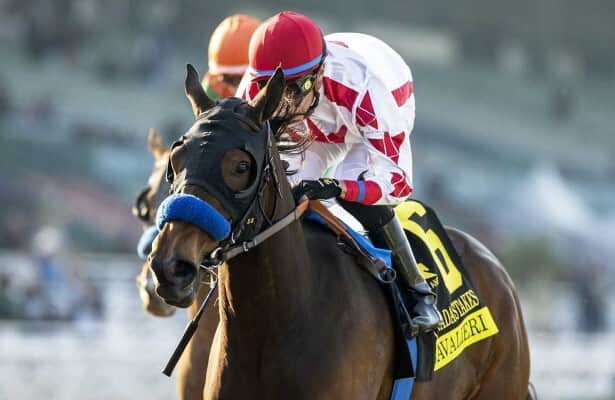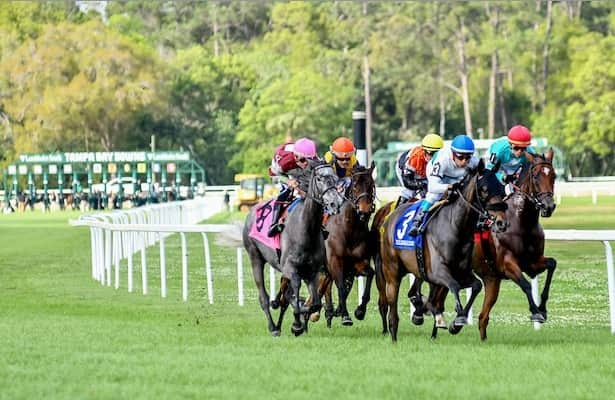Students listen to the presentations during the University of Kentucky Horse Racing Club meeting on Thursday, Jan. 16, 2025, at William T. Young Library Room B-108C in Lexington, Kentucky. Photo by Hannah Piedad | Staff
On what is normally known as the loudest floor of the William T. Young Library, one room, B- 108C, is almost completely engulfed in silence as students look to a lone speaker at the front of the room.
Recounting her time spent pursuing a veterinary career, Claire Foster, a veterinarian for Hagyard Equine Medical Institute, gives these silent students a glimpse into her journey, and the dedication it took to get to where she is.
Listening to stories like Foster’s is common for these students. As members of the University of Kentucky’s Horse Racing Club, opportunities like this are available to them at their fingertips.
Between guest speaker events like Foster’s, and tours of highly regarded facilities like Keeneland; Horse Racing Club members are gaining valuable insight into the inner workings of the “Horse Capital of the World,” according to Sydney Richmond, the club’s president.
Providing members with these experiences is a goal for Richmond, as she says she aims to show members the “range of specialties” they can pursue within the equine industry.
“I want to expose members to other career paths,” Richmond said. “I’m just trying to show members that there isn’t just one way to do things. Like, you don’t have to be a trainer, you don’t have to be a vet to be involved.”
Having a long-time interest in horses, Richmond said when she came to UK she talked with an advisor about joining the Horse Racing Club. However, she learned the club had become inactive during the COVID-19 pandemic.
This is when Richmond said she took it upon herself to bring it back to campus.
“I wanted to join the horse racing club . . . I talked to my advisor about it, and she told me that the club didn’t actually exist,” Richmond said. “I was like, ‘What does the process look like for reactivating the club?’”
A main point of concern for Richmond and Laurie Lawrence, the faculty advisor for the Horse Racing Club, was the student interest and turnout. Since then, these fears have eased with the club now having over 60 members, ranging from freshman to graduate students.
Mina Clay, the social and recruitment chair for the club, said she felt “so happy” to now have a space to share with students with similar passions since the club returned.
Clay said members gain valuable guidance on pursuing such passions, as they are able to meet and hear from professionals in the industry.
“The people at the farm and a lot of times in the industry, people like having a name to a face,” Clay said. “If they’ve talked to you, if they know who you are, they really want to get to know you more.”
For instance, during Foster’s speech she offered to allow members to ride along with her as she did her work at the Hagyard Equine Medical Institute.
Clay said while the Horse Racing Club offers ample opportunities, the cost for students is minimal, saying it was one of the more “accessible” equine clubs.
Upon payment of their $20 semesterly dues, members are allowed to take advantage of anything the club offers, including tours and volunteer events. They are also free to attend weekly club meetings in room B-108C of the William T. Young Library on Thursdays at 6 p.m.
Being in Lexington, many of these opportunities don’t require members to travel long distances to participate, according to Clay.
“Everything that goes on in the industry is here,” Clay said. “You have a way to kind of experience it.”
This was something that Greta Colley, a freshman equine science major and member of the Horse Racing Club, also resonated with. Originally from Atlanta, Georgia Colley said the horse community back home was “nothing compared to Lexington.”
She said being able to share what she enjoys with other like-minded students makes her feel valid in her aspirations.
“Being from Atlanta, there’s not a lot of horse people, so I think in school you’re always labeled like the weird horse girl,” Colley said. “It’s kind of fun to be surrounded by other people who also share the same interests, and you don’t have to feel embarrassed or like you have to hide it.”
Having the chance to immerse themselves in the equine industry before entering the job market, Colley also said the Horse Racing Club gives members a “leg up” when entering the field.
“I think it really kind of gives you that foot in the door. I think that is always the hardest part with the industry,” Colley said.
Helping Lexington live up to its legacy as the “Horse Capital of the World,” UK’s Horse Racing Club is not only providing students with this “foot-in-the-door” experience, but also with a community filled with support, opportunity and guidance.












